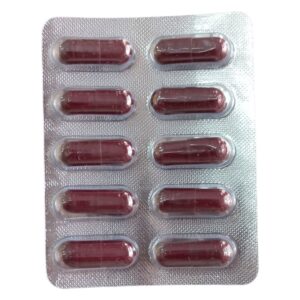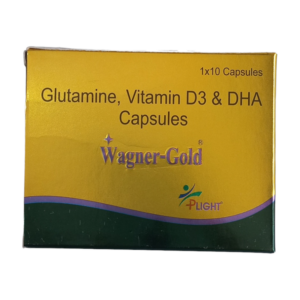GLUTAMINE + DOCOSAHEXENOIC ACID + VITAMIN D3 (CHOLECALCIFEROL)
Glutamine: Glutamine is an amino acid that plays a crucial role in various bodily functions. It is commonly used as a dietary supplement to support muscle growth and recovery, improve immune function, and enhance gut health. Additionally, glutamine is sometimes prescribed medically to manage certain conditions such as chemotherapy-induced mucositis, inflammatory bowel disease (IBD), and HIV/AIDS-related weight loss.
The exact mechanism of action of glutamine is not fully understood. However, it is known to be involved in numerous metabolic processes in the body. Glutamine can serve as a building block for proteins, support the immune system by maintaining the integrity of the intestinal barrier, and act as a fuel source for rapidly dividing cells, such as those found in the gut lining.
The recommended dose of glutamine varies depending on the intended use. In general, for muscle recovery and immune support, a daily dose of 5-10 grams is typically suggested. For medical conditions like chemotherapy-induced mucositis, doses can range from 10-30 grams per day, under the supervision of a healthcare professional.
Glutamine is generally well-tolerated, and few side effects have been reported. However, some individuals may experience mild gastrointestinal symptoms such as abdominal pain, bloating, or diarrhea. These symptoms usually occur when high doses are consumed and can be minimized by starting with a lower dose and gradually increasing it over time. It is important to note that individuals with certain medical conditions, such as liver or kidney disease, should consult with their healthcare provider before taking glutamine, as it may lead to complications.
As with any supplement or medication, it is always advisable to consult with a healthcare professional before starting glutamine to ensure it is appropriate for your specific needs and to avoid potential drug interactions or contraindications.
Docosahexenoic Acid: Drug: Docosahexaenoic Acid (DHA)
Use: Docosahexaenoic Acid (DHA) is a form of Omega-3 fatty acid. It is essential for the proper functioning and development of the brain and eyes. DHA is commonly used as a dietary supplement to support brain health, particularly for pregnant and breastfeeding women, infants, and children.
Mechanism of Action: DHA is a crucial component of cell membranes, especially those found in the brain and eyes. It plays a vital role in maintaining the structure and function of these cells. DHA also affects neurotransmitter function, neuroprotection, and inflammation regulation, which may contribute to its positive effects on brain health.
Dose: The recommended dose of DHA varies depending on age and specific health conditions. For adults, a typical daily dose range would be around 200-300 mg per day. For pregnant and breastfeeding women, the suggested intake is higher, typically around 300-600 mg per day. Infants and children may require lower doses, usually 10-100 mg per day, depending on their age and specific needs. It is important to follow the recommended dosage instructions on the product label or as advised by a healthcare professional.
Side Effects: DHA is generally considered safe when taken at appropriate doses. Common side effects are rare but may include gastrointestinal discomfort, such as nausea, diarrhea, or indigestion. In some cases, DHA supplements may cause a fishy taste or odor, burping, or a mild rash. Allergic reactions to DHA supplements are extremely rare but may occur in individuals with known allergies to fish or seafood. If any unusual or severe side effects are experienced, it is advisable to consult a healthcare professional.
Vitamin D3 (cholecalciferol): Vitamin D3, also known as cholecalciferol, is a fat-soluble vitamin that plays a crucial role in maintaining bone health and regulating calcium and phosphate levels in the body. It can be obtained from food sources or synthesized in the skin upon exposure to sunlight.
Vitamin D3 is primarily used as a dietary supplement to treat or prevent vitamin D deficiency. It is commonly prescribed for individuals who have limited sun exposure, dark skin, or certain medical conditions that inhibit proper absorption of vitamin D.
The mechanism of action of vitamin D3 involves its conversion to its active form, calcitriol, in the liver and kidneys. Calcitriol acts on the intestines, promoting the absorption of dietary calcium and phosphate. It also acts on the bones to facilitate the release of calcium and phosphate into the bloodstream, and it regulates the activity of parathyroid hormone (PTH), which helps maintain calcium homeostasis. Overall, vitamin D3 supports bone mineralization and prevents the development of rickets in children and osteoporosis in adults.
The recommended dose of vitamin D3 varies depending on the individual’s age, health status, and the severity of their deficiency. Daily doses commonly range from 400 to 2000 international units (IU). However, higher doses may be required in some cases, under the guidance of a healthcare professional.
Side effects of vitamin D3 are generally rare, but excessive intake can lead to vitamin D toxicity, also known as hypervitaminosis D. Symptoms of toxicity may include nausea, vomiting, weakness, excessive thirst, frequent urination, and elevated blood calcium levels. Prolonged excessive intake of vitamin D3 can cause calcium buildup in the blood vessels and other soft tissues, leading to a condition known as hypercalcemia.
Individuals with certain medical conditions, such as hypercalcemia, kidney stones, sarcoidosis, or certain types of cancer, should use vitamin D3 with caution and under medical supervision. Additionally, it is important to discuss any existing medications or medical conditions with a healthcare professional before starting vitamin D3 supplementation.


